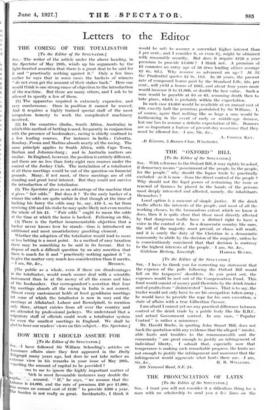THE " OXFORD " BILL [To the Editor of the
SPECTATOR.] Stn,---With reference to the Oxford Bill, it may rightly be asked, if democracy means "government of the people, by the people, for the people," why should the liquor trade be practically excluded—as it is now—from the direct control of the people ? Why should not the legal power of restraining the issue or renewal of licences be placed in the hands of the persons most deeply interested and affected, namely, the inhabitants themselves ?
Local option is a measure of simple justice. If the drink traffic affects the interests of the people, and most of all the working classes, to the tremendous extent which we know it does, then it is quite clear that those most directly affected by that dangerous traffic have a distinct right to have a voice in the control of it. In a democratic country like ours, the will of the majority must prevail, or chaos will result, and it is surely the duty of the Christian in a democratic • community to abide by the decision of the majority, unless he is conscientiously convinced that that decision is contrary to the highest interests of the people.—I am, Sir, &c.,






































 Previous page
Previous page